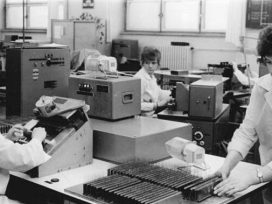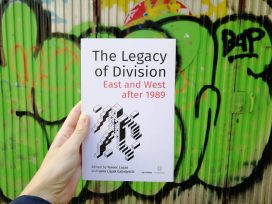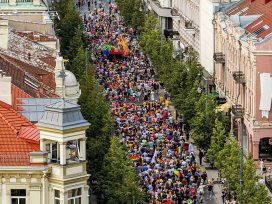Once upon a time in 1989
How the West is now learning the hard lessons of the East
In the first of a series of articles from the landmark 50th edition of Transit (to be published in September), author Slavenka Drakulić casts a rueful glance over the expectations – some fulfilled, many frustrated – of the generations that have lived through the changes since 1989.
I imagine a cosy dining room somewhere in eastern Europe, in Bucharest or perhaps Zagreb. But it could be Timișoara or Bratislava as well. It is Sunday, and a family has gathered for lunch around a big table, as they often do in my part of the world. Usually, first comes a beef or chicken soup with home-made dumplings, then a hearty meat dish and potatoes from the oven, garnished with vegetables, followed by cake and coffee. There are three generations around the table. Mother and father are about my age, born some time in the early 1950s. Their children were born in the 1980s – just in time to remember a little bit of life under communism, that is. And their grandchildren are too young to care.
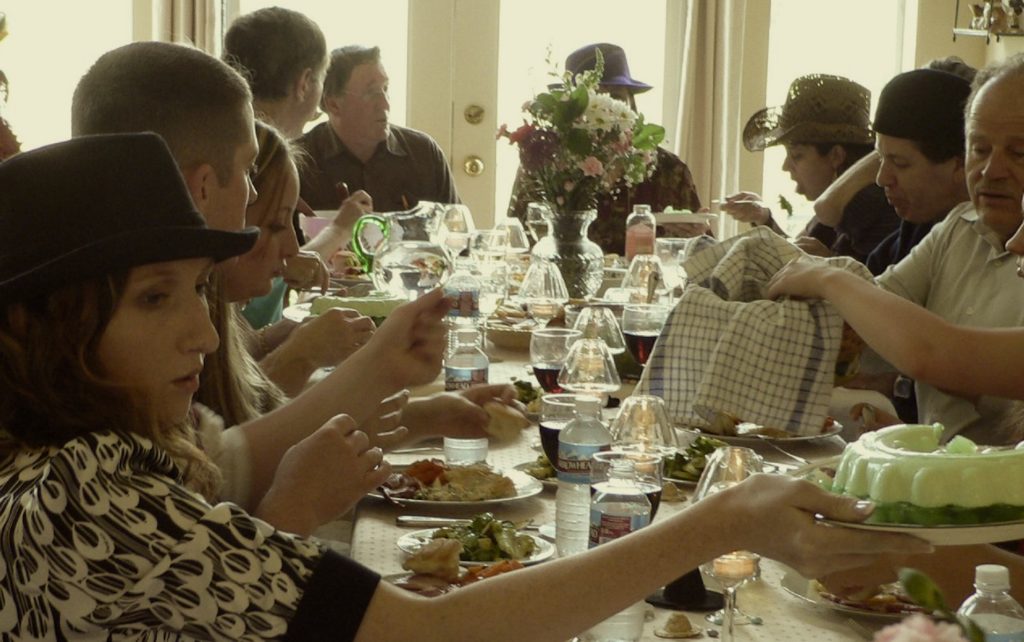
Photo: Bev Sykes. Source: Flickr
Such a lunch takes time, because you eat and talk and talk and eat. They talk about memory. ‘Do you remember 1989?’ the father asks the mother, who is busy serving the soup. ‘After all, it was a historic year for our generation. Looking back at those events, I am amazed how close yet far away it all seems today,’ he continues. ‘Close, because I remember it so vividly as if it happened only yesterday. Far away, because someone born that year, yes that whole generation, will soon be thirty.’
‘Of course I remember,’ she says. ‘But you know, when I was young, World War Two seemed to belong to the very distant past, although to my parents it must have felt as vivid as 1989 does to me. Back then, I didn’t think that old history had anything to do with my life. It must be the same for someone born in 1989. What could that year, or communism for that matter, really mean to them, more than what they’ve gathered from our scattered and perhaps even nostalgic memories?’
Nodding his head, the father turns to their two children: ‘True, but I wonder less about the past and more about what you think about what happened afterwards, after 1989?’ For a moment his question remains hanging in the air.
***
Past and present are often compared in conversations around our tables. Conversations taking place at home, as if we are still afraid of publicly addressing the gap between personal memory and ‘official’ history, like in the old times. Is our memory deceiving us, when we remember unimportant details, maybe a smell of snow in the air on that particular day, 9 November, or a feeling of relief, maybe tears in the eyes of the person next to us while we watched the Berlin Wall crumble? Or other fragments in that chain of events which later would be described as a revolution, even though I would rather call it an earthquake, because of the enormous impact it had, how it rocked the fundaments of our existence?
I remember the expression on the face of Romanian dictator Nicolae Ceaușescu. A camera caught him at the exact moment when he realized that the tide was turning against him. Shock and disbelief. What I saw in that face will stay with me forever. Apparently, people rarely see the big picture or immediately understand the real meaning of events they witness. In the case of the fall of communism, the dominating feeling at the time, it seems to me, was surprise. Joy came only afterwards, mixed with a bit of suspicion. ‘Is it for real?’ you would ask yourself. One reason for that might have been that we were not capable of thinking about the future at all, to imagine it in any other light than the drabness of our present.
No, our remembrance does not play tricks on us, despite these fragmented pictures and emotions deeply deposited in our memory. The whole big earthquake, its causes and consequences, escaped us then only to come back later as history. Therefore it becomes important how we remember it, if there are discrepancies and gaps, like we know it from the old times.
There is another discrepancy that comes to my mind when remembering 1989: the one between history and fantasy. There was a certain innocent naïvety sweeping over Eastern Europe, the hope that the fall of communism would be, in some way, a guarantee that we would live happily ever after. The reason I call it innocent is that we really didn’t know what to expect, but we knew what we wanted: glitter and glamour, like on the other side, in the West. What else could we think of, but sheer old-fashioned magic, as in a provincial circus performance? Or in fairy tales for that matter. In our perception, what had just happened was nothing but a fairy tale, in which a poor young man, overcoming insurmountable obstacles put in his way by the princess’s father, wins her heart and becomes a king himself. What other concept – or, indeed, ‘narrative’, as it is called today – did we know? Democracy was a vague and distant idea, a theory never to be reached in practice. Human rights even more so. And capitalism we understood only as far as supermarkets full of incredible food and unknown trifles took us. That was a reality we could touch and smell, consume, buy, possess – the very measure of our success. Hard work for little money, poverty and jobless people were not part of that parcel.
We had no experience of the new world opening up to us, we had only dreams made of TV images, movies, rumours about freedom of expression, finely wrapped chocolates and the glowing lights of shopping windows in Vienna or Paris.
There is another reason why I think we were naïve: the belief that such a dramatic change, the collapse of an entire political system, would go smoothly and gently, with few victims and limited conflict. We did not foresee the profound changes that were in the making, including the fact that they were of two kinds: progressive, modern, liberal, tolerant – as well as the opposite. The coin had two sides, on one democracy and freedom, on the other exploitation and poverty. Maybe it was simply easier to believe in the new reality and not question it, to embrace luxury more than democracy, greed more than human rights. Even if our fantasy about ‘Europe’ and all that it meant did not last long.
Underneath the big change, a reaction to it was going on. When the earth trembles under your feet, you look for security in what you know, in what you remember, in what was there before communism collapsed.
But what was actually there to fall back on? Not much, but there were two strong pillars of collective identity: the national and the religious. Even during communism, although suppressed, national identity was preserved in language and culture. And there was religion, in some nations more important, in others less. It was an inseparable part of national identity, although expressed more in the form of tradition and culture than as regular religious practice. Indeed, national identity and religion came to dominate public discourse very soon after 1989 – to the surprise of the people and politicians in the West, where nationalism (they believed back then!) belonged to the past and religion was considered a purely private affair. At first, it seemed to them as if the Eastern Europeans were not only coming from a different place, they were coming from another time, too.
But that was not the only misunderstanding. The perception of our mindset or mentality was just as problematic. It is more difficult to explain and hard to pinpoint exactly what this phenomenon is about, but it is vital to understand Eastern Europeans from a psychological point of view. In 1989, most of them had spent a big part of their lives under communism. This experience, common to all, formed their values and perceptions, their habits and expectations, in short, their worldview. It formed a specific kind of mentality – and while a political regime might be changed overnight, that mentality cannot. To alter it takes time; indeed, generations.
In the new post-communist reality, joy was soon accompanied by a feeling of disappointment triggered by growing poverty and the gap between those who made a fortune when state property was privatized and the extremely poor, by corruption, and by a distrust of the political elite as well as of the impermeable EU bureaucracy. No doubt, there were many positive changes, of which access to all sorts of new products was the only one embraced unanimously, just like in the West. Stability was replaced with the mobility of goods, businesses and people. But when you have freedom of movement but no money to travel, that freedom will in the end, in your eyes, be devalued. ‘Europe’ did not live up to our fantasies, because such fantasies could never become reality. Instead, it was accused of neo-colonialist exploitation, for creating economic injustice, for the lack of jobs and the democracy deficit, or for simply not sending us enough money.
I cannot say that something went wrong after 1989, only that the fairy tale ‘narrative’ did not work. In the meantime, we learned the hard way that we are not the same kind of Europeans, that some are more European than others. Living in the periphery and coming from another time, simply makes you a second-class European. Like laundry detergents or canned food in our supermarkets. Or fish sticks, for that matter. They look the same, they have the same name, but for Austrians they contain 65% fish meat, while for Slovaks only 58%. It is called ‘adjustment’ to the market. International brands, now also available in our countries, use either different ingredients or less of the same ingredients: the result is lower quality products. Slovak researchers recently found that, compared to Austria, this is the case with 50% of the products in their shops. It feels like a slap in the face, but it is also a good metaphor: the brand name is the same, but the quality is not. What more proof of inequality do you need?
***
Meanwhile, the family around the table has finished the opulent lunch and the daughter starts to talk: ‘You want to know about our view of post-1989? It’s strange. Just the other day I found it captured in a single film. Graduation. It’s by a Romanian director, Christian Mungiu. The main character, Roman, is a medical doctor a few years older than me. He belongs to a generation that believed in the transition and in principles such as truth and decency, that believed that reality can change if we stick to rules, if we ourselves are better people. His idealism fades away, but one hope remains: his daughter, Eliza. She was brought up with high principles, prepared to study and live in Great Britain. She gets a grant, but the fulfilment of his (not her!) dream depends on her passing the final exams. This should just be a formality for such a bright student, but on the very day when the exams start, Eliza becomes the victim of attempted rape, which leaves her traumatised and she is unable to perform. Realising that his daughter’s future is at stake, Roman embarks on a long journey of corruption – something he fought against all his life.
‘Corruption permeates every cell of Romanian society, from the school to the police, from the ministry to the hospital and the financial inspectors. Now Roman is caught in a web and we see how corruption influences him on a very personal level – for without it there is no way for him to reach his aim.
‘Romania is in the EU, it is a democracy, there is capitalism – yet only on the surface. When you scratch it, the real Romania shows through and it doesn’t appear to be much different than it was 25 years ago, when party membership and VIP connections were the means of survival and the main currency of corruption. This goes for most other Eastern European societies, really. And it was your generation that couldn’t get rid of it! And don’t come and tell me that there is corruption in the West, too. There is a difference between the individual cases of corruption in the West, and corruption as a system, the way society functions in the East. This hasn’t changed, not even in 25 years!
‘This film left me with a bitter taste of defeat. Having no hope for change is perhaps the biggest loss of my generation… No wonder so many of us are depressed! As for me, let me just tell you that ever since I saw it, I ask myself: should I leave?
‘Is it too late? I fear it is.’
***
2017 started badly: Donald Trump became the president of the United States, Brexit looms over the EU like a dark cloud; the politics of exclusion are becoming mainstream, and nationalism and nativism are on the rise, together with razor wire fences on the EU’s borders and a ‘great wall’ in the US; support for right-wing parties in France, The Netherlands and even in Germany are growing and threatening European unity; the burden of a million refugees is not being fairly distributed, while new ones are waiting on the doorstep; there are rumours about the Balkans being on the brink of war again; the war in Ukraine and the Russian annexation of Crimea have created a feeling that Russia has yet again become a real threat to Europe.
It seems that the European Union is in danger of falling apart, the member states being unable to agree on and confront a single important issue. We see confusion and feel uncertainty, but we do not get the whole picture. The changes are many and they happen fast; yesterday’s explanations are no longer valid.
Only a few years ago, Europe was a quite different place. Today’s problems were surely there, but the feeling was different, there was energy in the air. New countries wanted to join the EU, there was a desire to include Ukraine at least in trading, and the EU was still promising peace and security, emanating values to aspire to and possibilities for a better life for everybody. Most importantly, there was the feeling of a common European interest, beyond the national perspective.
Or did it just look like that to us Eastern Europeans, who wanted that rosy future so much that we didn’t want to see the pink colour washing off much earlier?
In my part of Europe, life has in recent decades evolved on two levels: on one we were trying to adapt and emulate European standards and expectations, but at the same time we built a psychological defence mechanism of collective identity based on nation and religion. There was not much more there with which we could confront the new situation. In the concept of national identity all the disappointments with the EU were summed up, the frustration coming from our position in the union, fear of globalization, fear of immigrants who appeared as new, more needy victims, ready to take our place.
What we developed was something very similar to that which Zygmunt Bauman called ‘Retrotopia’, whose main characteristic is the ‘rehabilitation of the tribal model of community’. We turned back to what was before, more imagining than remembering it. Just as more and more people in the West do today. Nostalgia? Yes, if that could be used as a useful means of establishing a defence mechanism by returning to the past when faced with a reality one doesn’t understand. However, it is more than that, it is a restorative, anti-modern form of nostalgia, a nationalist revival which reached its peak in the Yugoslav wars and currently attracts voters all over Europe and beyond.
The problem was that the concept of national identity was a very old-fashioned one: this identity was perceived as cast in stone, fixed forever – that was exactly why it was perceived as something steady and stable, something secure to fall back on. However, national identity is in reality anything but that. In modern anthropology it is defined as a construct made up of all kinds of material, from history to myths, from folk tales to kings one does not even know for sure existed, as well as symbols contrived much more recently. For example, the newly created state of Croatia had to invent all its basic symbols – from flag to anthem, from uniforms to honorary medals.
As in most Eastern European countries, one of the defining elements of national identity in former Yugoslavia, a federal state, was religion – Catholic, Orthodox and Muslim. Religious practice was not forbidden, but the majority of the population did not practice it (for understandable reasons) – and still it didn’t disappear, not from culture, nor from habits and values, national myths and folklore. Or, to formulate it differently, religion was not eradicated by communist propaganda, it went underground. And then it reappeared, rehabilitated, just before and during the wars. Suddenly, culture and national belonging were explicitly connected to religion, and vice versa – regardless of whether you were a believer or not. Wars do not allow for such ‘nuances’. To be Croat meant to be Catholic. To be Serb meant to be Orthodox.
It is difficult to speak about 1989 and not to dwell on the wars between 1991 and 1995 in former Yugoslavia. These wars did not fit into the general picture at the time; they were in stark contrast to the peaceful process of unification and transition that supposedly characterized the Velvet Revolutions. No one in the West could understand what happened back then, and, I am afraid, it’s no different today. Moreover, as Yugoslavia was the most prosperous and free of the communist countries – in comparison to the Soviet Bloc – it was even more difficult to comprehend what happened there. Was it just an outburst of hatred between belligerent Balkan tribes? Indeed, in the absence of a coherent explanation, many were ready to embrace the old Balkan cliché of ‘hundreds of years of hatred’. But the key was just there: it was exactly the fact that Yugoslavia didn’t belong to the Bloc that laid the ground for these conflicts. That Yugoslavia could develop its own kind of socialism meant that resistance to authoritarianism was weaker here than in, for example, Czechoslovakia or Poland. In Yugoslavia there was no Václav Havel, Adam Michnik or Lech Wałęsa. There was no democratic opposition building up under communist rule – nor against the growing nationalism.
There were, for sure, many political and economic reasons to create tension and form opposition in the federation – but nobody but the nationalists were politically organized and ready to take over political power, even if it was at the price of going to war. The leaders here were called Radovan Karadzić, Vojislav Šešelj, Franjo Tuđman and Alija Izetbegović. Yes, Serbia attacked Croatia first, then Bosnia, and Kosovo’s status is still not completely resolved. But the point is that some 20 years and 150,000 victims later, independent nation states found themselves at the doorstep of the European Union. And they were all hoping to join yet another union, ready to renounce their newly won sovereignty in a turnaround that one can only describe as ‘the Balkan paradox’.
The wars were ignited by nationalist propaganda. In that propaganda, equating nation with religion, and vice versa, was the main strategy. In pre-war propaganda, nation and religion became means to identify and distinguish the ‘enemy’. Furthermore, it became a means of exclusion. In a culture that for decades had been presumed to be atheist, religion fused with national belonging suddenly became a matter of life and death: Catholic Croats vs. Orthodox Serbs, Orthodox Serbs vs. Muslim Bosnians…
This political use of identity, reducing a nation to a religion, was in a way the vanguard of what is happening today in the rest of Europe. Today’s immigrants and refugees are, in the same way, no longer allowed to be individuals, not even members of a state or a nation. They are reduced to a religious identity. Waiting at the border between Greece and Macedonia, a sea of migrants, all the same: Muslims, terrorists – a threat. It took a small Syrian boy, Alan Kurdi, who died on a Turkish beach on 2 September 2015, to realize that it is not so. But the insight only lasted for a moment. Defining identity as something fluid, multi-layered and non-monolithic is out – for all of us, but above all for the migrants. They are no longer allowed to be individuals, already they are all reduced to a single quality, to their Muslim religion, regardless of whether they are believers or not. And every Muslim is a terrorist suspect. This practice of reducing individual human beings to their (alleged) religious identity is certainly not limited to Europe, Trump’s ‘Muslim ban’ is a product of the same kind of thinking.
We tend to forget that we, too, are reduced in the same way.
I get scared when I now see that very same Balkan pattern being repeated in the West.
When nationalism is conflated with religion, what you get is a deadly brew. If there is anything to learn from the wars in former Yugoslavia, it is that a step back into our own past is always possible.
***
Before their departure, the family at the dining table would probably agree that life after 1989 is not what the parents naïvely believed it would be – living happily ever after. It’s much more complicated.
But if the parents were naïve, the younger generation didn’t turn out to be much smarter, with their expectations of rapid, positive change. Now they are all stuck with one foot in the past and the other in an unpredictable future. Not much different from similar families in the West. They would probably agree that we are again left with no means to comprehend the situation we’re in, no matter if we’re living in Eastern or Western Europe; that we’re every day having to learn how to live with fear, which breeds hatred and worse. That the only alliance forming at the moment is the one against the alleged threat of Muslims. The European Union is shaking dangerously, and Europeanism – an identity in the making – has acquired a new meaning: building a wall against immigrants. We are all together reduced to the lowest common denominator, to an ugly face of Europe – one we never wanted and couldn’t imagine would ever appear again.

Published 4 August 2017
Original in English
First published by Transit 50 (in German) / Eurozine (in English)
Contributed by Transit © Slavenka Drakulić / Transit / Eurozine
PDF/PRINTPublished in
In collaboration with
Newsletter
Subscribe to know what’s worth thinking about.
Related Articles

A back-handed Christmas present: the EU takes dire steps to erode the right to asylum. Even the ‘warm welcome’ of Ukrainian refugees is crumbling. The holiday episode of Standard Time is here.
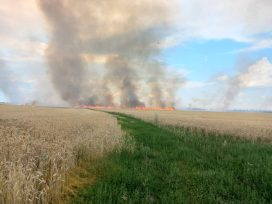
In the 1990s, Ukraine again became one of the world’s leading grain exporters after decades of Soviet agricultural mismanagement. It retains this status despite the major disruptions to the European grain market caused by the war.



